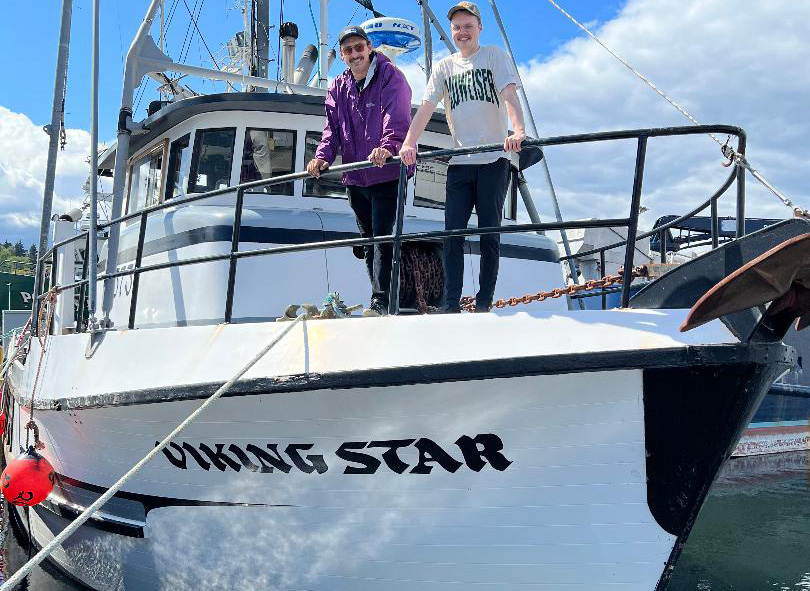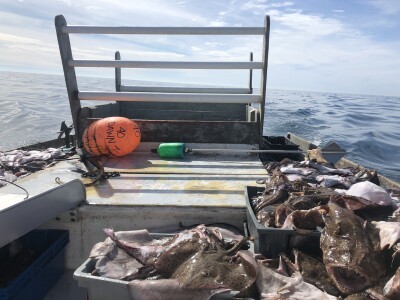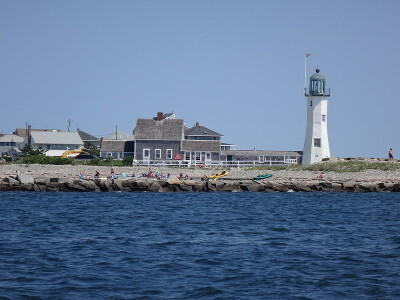Why do it? Why go through all the hassle and hard work of being a commercial fisherman who is dependent upon lady luck and mother nature (both very fickle gals) to make a living? The story of a couple of young fishermen and their quest for a life like their fathers, sheds light on these questions.
Hemingway’s novella “The Old Man and the Sea,” about an old fisherman on a bad streak, shows some of the adventurousness, love of nature, and drive for success that is typical of fishermen. Seeing spectacular sunsets on the water, watching fish frolicking, and feeling the immense power of the ocean tossing the boat in rough weather, is only part of a fisherman’s life.
And it’s just one side of the coin. There also is very good money to make in commercial fishing, and opportunities aplenty for those skilled and ambitious enough to tackle the many stresses of it, including sometimes foul weather, and good or bad luck. Of course the real risk of catastrophe does exist in this trade. Sometimes, a fisherman dies at sea. More often, the average dedicated fisherman will simply make a good living.
So, while fishing has risks, it’s not risky like kayaking or other extreme sports (that don’t pay handsomely, as fishing can), though similar inasmuch as both courage and physical vigor are needed for the work. Also, maybe those sunsets and wildlife and the time-honored tradition of harvesting fish from the sea for the public’s dinner table, also is rather romantic. You might call it old school cool.
And perhaps that combination of love of nature and physically challenging work, and healthy pursuit of profit, are a sort of yearning you’ll only find in a select few folk like commercial fishermen. Clearly, the trade is just the right thing for some adventurous types.
Sometimes these skills and desires run in the family. With two Washington state 20-something fishermen, fishing is a family affair, and their parents are proud of them. One of their mothers, Joanne Wilson, contacted National Fisherman about this human interest profile, having a feeling it would be just the kind of story that readers of this publication enjoy. Neither she nor the young fishermen’s other parents wanted to speak on the record for this story, preferring instead to let the young men tell their yarn on their own.
It's a heckuva fishing story, but with no exaggeration, and all of it is true.
Spencer Mannes, 25, and Zack Wilson, 24, have been friends all their lives and have fished together a lot over the years. Both of the young men are like their fathers, Leif Mannes and David Wilson, who also are fishermen and work together as partners on their boat, the Keta. That vessel, originally built in 1976 at 83 feet, recently was converted from 100 feet to 123 feet. The men use the Keta to fish crab in the Bering Sea and the Gulf of Alaska.
Now, the young men have made a partnership from their friendship, buying a boat together to fish Dungeness crab in Alaska and for other catches, too. Their new boat, the Viking Star, is circa-1978, 58-foot Delta.
Buying the boat is the culmination of the better part of a year of planning by the partners.
“We’ve been talking about buying a boat for the last few years,” Mannes said. “Within the last six months we’ve gotten serious about it.”
The unpredictable nature of commercial fishing – there is no guarantee you’ll catch fish just because you’re looking for them – and the real possibility of catastrophic loss (financially or life or limb), might seem like too risky a living for many people. Most folks lack the courage and love of adventure and risk-taking that is commonly seen in fishermen.
Not these young men, who have guts aplenty.
Both of the partners grew up working in the business, helping their fathers fishing, and working in shipyards. Buying their new boat now, which they recently took possession of out of its former home in Anacortes, Washington, seemed like the right move at just the right time. The boat gives them freedom to pursue success, and the tools they need to make the most of their healthy work ethics.
“We wanted to work hard with our hands, and we’ve seen fishermen who’ve done well,” Wilson said. “And we see the opportunity to make a good living.”
A typical commercial fishing crewman can earn $15,000 to $50,000 for a couple months’ work. And that’s just a crew member, not an owner, as these two young men are. For the vessel owner, $100,000 or more per season is quite achievable. And given the partners’ backgrounds, buying their boat seemed to be the right move, at just the right time.
While growing up, the young partners worked in shipyards, and also fished together. Zack is a mechanic, and both men have mechanic training. Their background and training, and perhaps some yearning that is particular to fishermen and maybe even in the blood, compels them on this career journey.
To Mannes, their career choice is just a natural thing. If you are an aspiring fisherman – or maybe even just of longstanding fisherman stock – there could be a great likelihood that you are going to pursue commercial fishing for a living. After all, it makes sense in a variety of ways.
“It runs in the family. My grandfather was a fisherman, my dad is a fisherman, and my brother also fished. It’s all we know,” Mannes said.
Their new boat will be multi-purpose, and help them catch a variety of fish. That’s the idea – to maximize both opportunities, and profit. There’s excitement in this work, and you can hear the anticipation in the young partners’ voices.
“We’ll be fishing for Dungeness crab with it, but it’s also capable of longlining. We see it as a versatile boat,” Wilson said.
Their vessel hasn’t got that new boat smell, but to the young partners, it’s golden.
“We’re sitting in it as we speak,” Wilson said recently as he and his partner were cleaning up their boat, preparing it for action. “It’s a very stable, seaworthy boat…We anticipate getting into salmon fishing in the future.”
To the partners, there’s almost no need to explain their love of fishing. For those who are from a fishing background as these two are, the appeal of the trade is obvious.
“It’s a fulfilling job, all around. You put all of yourself into it,” Mannes said. “It’s a fulfilling feeling.”
It seems they have chosen wisely in terms of what will be their primary catch with the new boat – Dungeness crab. Due to tensions related to the Russian-Ukrainian war, the price of Dungeness crab is rising. Still, this quest to follow their fathers’ footsteps is not for the faint of heart, and will require both guts, and intensely hard work.
“I live for that physical labor of fishing,” Wilson said. “I know how to do it, and it’s exciting being out on the ocean – it’s beautiful, and it’s fun.”
He wasn’t always so sure about this trade, and Zack briefly went to college for business after graduating high school but realized he wanted to fish. While in high school, he had tendered in Alaska for a couple of summers. After high school he crab fished on a few boats, and also dragged for bottom fish in the Bering Sea.
During the past three summers, Wilson worked on a 58-foot salmon purse seiner owned by his family. He was a crew member/engineer for the first couple years, and then ran the boat as a captain.
In their quest to extend this trade into the next generation, the young partners also have taken advantage of their fathers’ fishing knowledge.
“We’ve definitely asked our fathers for advice,” Wilson said. “But we’re doing all the work of buying the boat, and made the decision on our own.”
They are setting their sights high, and hope for great success as smaller commercial fishermen.
“The opportunity s big – there have been boats that have grossed a couple of million dollars,” Wilson said. “You get out of it what you put into it, is how I see it.”
Of course, there is no guarantee any season will be good. Mechanical failures, foul weather, and inadequate catches are all possible downfalls to success. You never know what you are going to get. That unknown factor is part of the appeal to the fishermen.
“I like the uncertainty of it – the chance that you could have a good season, and do great, or not do so good,” Mannes said. “Every day is exciting.”







